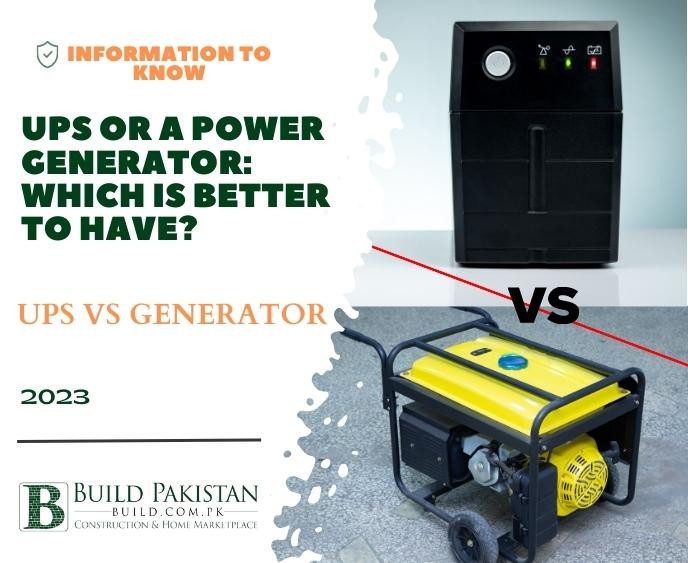UPS Or a Power Generator: Which is Better to have?

Introduction:
Uninterruptible Power Supply (UPS) systems and generators are
the two primary alternatives on the market when it comes to purchasing power
backup equipment in Pakistan. These two gadgets are highly dissimilar to one
another and exist in a wide range of sizes. When choosing one of these power
backup units, as a homeowner, you should be well aware of the distinctions
between a UPS and a generator. So, which should you pick—a UPS or a generator?
Well, after reading this site, you'll be able to make an informed decision in
this area.
What is UPS?
In the case that the electrical power fails or drops to an undesirable voltage level, a battery-powered gadget serves as a backup power source. Several sizes are available for UPS systems. In contrast, larger UPS systems have enough battery life to power various electrical appliances in your home for several hours. For instance, small UPS systems are used to provide power backup for only a few minutes, which is sufficient to shut down the computer properly and save your important files. They frequently have connections to the many types of installed lighting in a home, including ceiling fans.

What is Power Generator?
A generator is a device that may generate electricity by
turning motor power into electrical power for use in an external circuit, as
the name suggests. There are many different kinds of power generators on the
market today. Because to their widespread usage in the household, industrial,
and commercial sectors, these devices are available in a range of sizes and
designs. Depending on their scale, these devices may generate a huge amount of
electricity, which can be used to power anything from a single room to an
entire business. Depending on the kind and brand, Pakistani generators can run
on petrol, diesel or natural gas.

THE KEY DIFFERENCES BETWEEN A UPS AND A GENERATOR
In order to decide which option is ideal for you when it
comes to purchasing power backup devices in Pakistan, let's learn about the
distinctions between a UPS and a generator, which have been emphasized in the
tips below.
OBJECTIVE PURPOSE:
Power backup systems include the use of generators and
Uninterruptible Power Supply (UPS) systems. As was previously said, UPS systems
are made to offer a backup power source to keep the tiny electrical appliances
in your house operating continuously during a power outage. They safeguard the
linked devices from power spikes. Generators, on the other hand, may be
connected to the primary power source because of their versatility. The bigger
generator models—which also include a stand-by power option—are therefore
appropriate for usage in the commercial and industrial sectors.
THE MAINTENANCE FACTOR:
Because UPS systems rely on batteries, you must regularly
check the fluid level in your battery to ensure that it doesn't run out of
power and harm your power backup system. On the other hand, as power generators
in Pakistan run on either petrol, diesel or petrol, the necessary fuel must be
continuously provided. However, maintaining a generator could be more expensive
than keeping a UPS at home. Your home's electrical supply is used to charge the
UPS system's battery, which may result in an increase in your power bill but
may still be less expensive than using a generator.
THE VOLUME OF NOISE:
Noise is one of the main reasons why people choose to use
generators over UPS. Power generators produce noise pollution since they are
powered by combustion engines. The deafening noise these generators make is
just intolerable for those living in small houses and apartments, especially
when it echoes off the building's walls and roof. Power generators now have
sound-proofing technology thanks to some cutting-edge advancements. Because of
this, it is now simple to obtain several power generator models that produce
little to no noise pollution.
SECURITY ADVICE FOR UPS SYSTEM USE:
Following are some crucial safety measures you should follow
while utilising a UPS system at home:
- Never place any electric equipment or metal components on top of batteries.
- When attaching or detaching battery terminals, turn off the charging source.
- Keep your UPS system from being overloaded to lower the
danger of fire.
TIPS FOR USING A GENERATOR SAFELY
The following are some of the most crucial safety advice for
operating a generator at home:
- Always run your home's electricity generator in a well-ventilated place.
- To prevent electrical risks like electrocution and fire occurrences, never pre-plug any electric appliances to the generator before turning it on.
- Before refilling, turn off your power generator and give it time to cool down.










